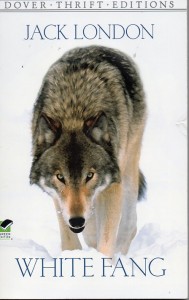Book Review: White Fang by Jack London
Like many a lad, I read this classic adventure story when I was quite young (despite it most assuredly not being a children’s book.) I have long planned to reread it when I had the opportunity, and was fortunate enough to get it for Christmas.
For those who have forgotten the plot, or somehow never got to read the book, the title character, White Fang, is a wolf-dog crossbreed who is born in the wilds of the Yukon Territory. He is captured by native humans and trained as a sled dog, then sold to a cruel white man who uses White Fang in cage fights. Finally White Fang comes into the possession of a kind man who treats him with compassion and retires to California.
This book is based loosely on Mr. London’s own experiences as a sourdough in the Klondike gold rush, and is a mirror to his book Call of the Wild, which is about a dog from California that is shanghaied to the Klondike and eventually goes feral. The story takes its own sweet time getting to White Fang. The opening paragraphs begin with spruce trees and ice in the Wild, then introduce dogs, then the sled they are pulling, and only then the humans who own the sled.
These humans are fleeing a starving wolf pack, and they don’t all make it out alive. We then follow the wolves for a while as their party dwindles. Finally two are left, and they spawn a cub who is named White Fang a couple of chapters later.
The harsh realities of death are constantly brought up in the story–most of the animals and several of the humans we are introduced to die, some of them at the fangs of our protagonist himself. There’s also a fair bit of musing on the “nature vs. nuture” question, though never put in those terms. White Fang’s behavior is based on his inherited instincts, but heavily modified by his environment; thus when he is finally shown compassion, White Fang can learn to love.
This is contrasted in the final chapter with an escaped convict, Jim Hall, whose circumstances have turned him into a hardened killer. (And in an instance of dramatic irony, has a genuine reason for his grudge against the judge who sentenced him to prison–he was innocent that time!) Hall never got that moment of compassion, and has passed beyond human redemption.
As you might have gathered, there are many scenes of animal abuse in this book which may be too intense for young readers. In addition, the story is a product of its time, and its portrayal of First Nations people is antiquated. (While White Fang “instinctively” knows that the white men are superior to the Indians, it’s made clear that this superiority is confined to ability to project power. The cruel Beauty Smith is a much worse dog owner than the harsh but practical Grey Beaver.)
There’s also some dubious canine behavior, some of which may be because Mr. London was genuinely mistaken, and other bits exaggerated to make the story more exciting.
Overall, this is really one of the great dog stories, and highly recommended to readers mature enough to handle the themes. This story is in the public domain and you should be able to find it in an affordable edition (often paired with Call of the Wild) even new, or readily available at any used bookstore or library.


I considered bying this one last week in a 3 for 2 sale, but decided against it. Now I wish I hadn’t!
There will always be other sales. This one is a classic, after all!